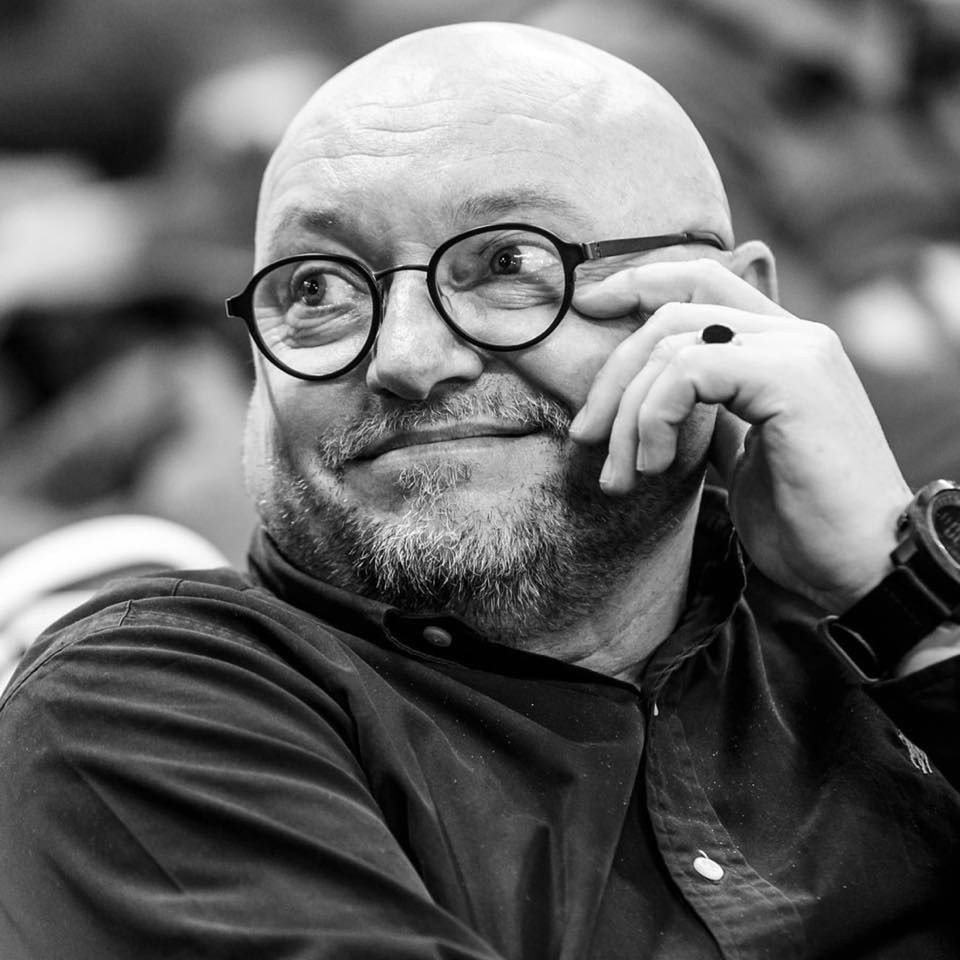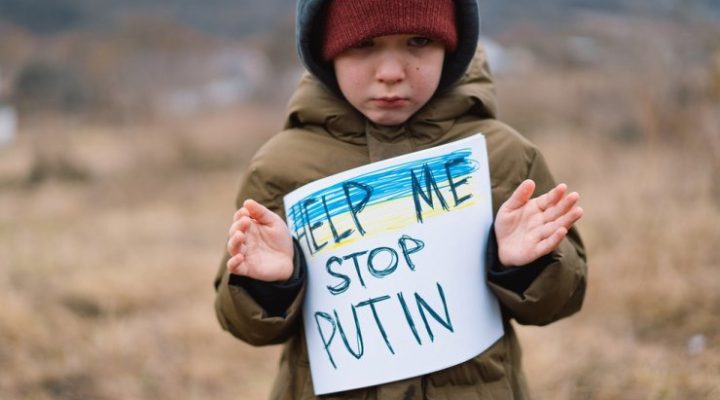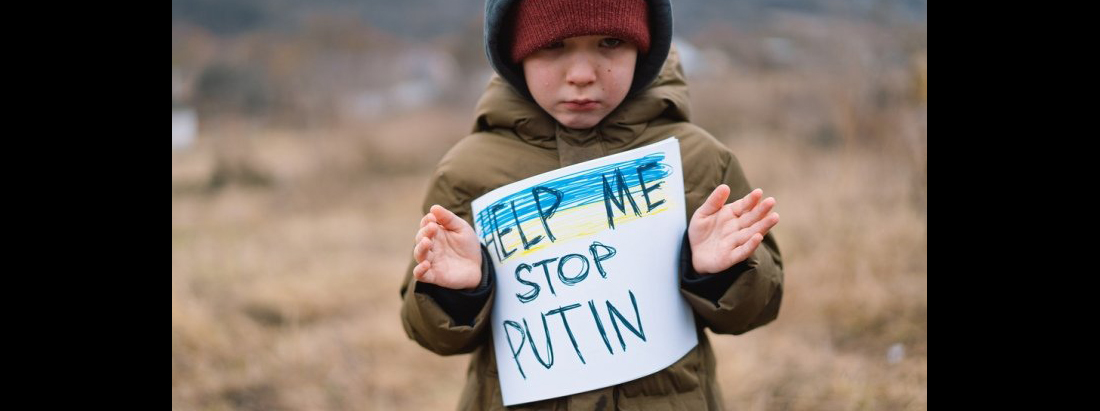Last week, I was in Amsterdam for the annual academic colloquium of the International Baptist Theological Study Center. Among the scholars present there was my friend Fyodor Raychynets, a distinguished Baptist pastor and theologian, and a leader of the Ukrainian Evangelical Theological Seminary in Kyiv, which I had the privilege of visiting several years ago.
I was so happy to see Fyodor again and also very pleased to meet his dear daughter Lisa. It is hard to describe the love with which these precious friends were surrounded and the relief all of us felt that after nearly a year of full-scale Russian war on and in Ukraine, they have survived and we could be with them.
I asked Fyodor if I could interview him for Baptist News Global once he had returned to his country. He graciously consented. Here is our conversation. It is harrowing, illuminating and inspiring.

Fyodor Raychynets
Q: Would you be willing to share how the war has affected you and your loved ones personally?
A: Just prior to the war, I lost my dear wife. She died after a severe COVID illness. When the full-scale war started, I evacuated my children to the west of Ukraine where it was relatively safer. I decided to stay in Kyiv in order to do the necessary volunteer work by helping the most vulnerable people affected by the war — the elderly, orphans and also the families of soldiers, their wives and children, their parents.
So the first and obvious effect of the war was a separation from my kids in the midst of our bereavement period. That is, in the time when we needed the support of each other, and the presence of each other in order to cope with grief, this cruel and causeless war burst into our lives.
The second effect of war was the impossibility of planning anything more than for today or at best for the next day, which may also change.
“How can you plan anything when you control nothing?”
How can you plan anything when you control nothing? When you do not know when the next rocket attack will take place, where these rockets will land, what destruction they will bring and what after effects it will have on your daily life?
How can you plan anything, having no electricity, no internet connection — and for many others even worse, having no water, or heating? No access to the basic yet necessary things to survive? In wartime your big plans about your life, ministry, work and, in my case, my studies, shrink to just hoping for basic things! A sense of uncertainty, insecurity, total unpredictability haunts you all the time and emotionally drains you. Yes, it is very annoying not to be able to plan or control anything in your life including basic needs.
But at that time, I did not know another tragedy was just ahead of me. In September, I lost my son. His heart just stopped beating while he was sleeping. He could not bear anymore the loss of his mother and the mad war all around. So, to the tragedy of the loss of my wife, and the war which ruined all my life’s plans, there was another loss. This time because of the war we had to mourn this irrevocable loss separated from my daughter.
Therefore, the loss of a beloved wife before the war, the loss of a son during a barbaric war, separation from a daughter because of the war, the fear of planning something after everything we have experienced is all that I personally had to go through and continue to go through. I would like to pass all this with dignity.
Q: Please describe for us how the work of your seminary has been affected by the war.
A: Our seminary is located in a very quiet, wooded area. Previously, it was a recreation area where people from Kyiv came for the weekend to spend time away from the city noise in peace and fresh air. When there was talk of a possible all-out war, we mistakenly assumed we were in a relatively safe place. We did not know one of the main directions of the offensive of the Russian army would be from Belarus. We were in that direction.
It so happened that after the invasion, I stayed with a few employees of the seminary in the seminary itself with all the full-time students, whom we did not have time to evacuate. I had to be responsible for the evacuation of the students and then the staff of the seminary. The very history of the evacuation is a separate story about what we had to endure together and what miracles the Lord performed.
After the successful evacuation, I, along with several staff (including the rector of the seminary who miraculously joined us after being blocked in Bucha) and a couple of students who expressed a desire to be part of our volunteer team, continued to stay at the seminary and serve people in their needs in our community. Russian troops were about 7 km from us. And the fiercest battles were fought, well, somewhere within three km of us in the village of Moshchun.
It was there that the Russian invaders tried to break through to Kyiv. All this time shells were flying over us in both directions. Ours hit the occupiers and the occupiers fired at ours. The place where we continued to stay became very dangerous, and one day our military asked us to leave our campus because it became unsafe for us to stay there. We moved to the interior of the city and settled in the office of the Ukrainian Bible Society (where we lived for the next 52 days). Literally a few days later, six shells flew into the territory of the seminary and caused significant damage to our buildings, especially the academic building and our cafeteria.
After we were forced to leave the seminary, and it became unsafe there, from time to time we broke through there under shelling in order to take valuable things out of the seminary, such as a database and servers.
“Our lectures have become more therapeutic than academic.”
As for the restoration of the educational process, it took us about a month to find all our students, wherever they were. We restored our educational process in an online format, and of course the war changed not only the format of study, but also the approach. Our lectures have become more therapeutic than academic. We were able to bring students to the end of the academic year in this new format.
Q: How has your vocation as a Christian minister been affected, and practiced, in the midst of this war?
A: When war breaks uninvited into your life, everything changes, especially the usual way of life. The way you are used to quickly getting where you need to go, the way you set up your life so that everything is nearby, it all breaks down. Distances break down, familiar comfort collapses, and what looked easy before the war becomes impossible after the start of the war. I am one of the pastors of the church, now in the well-known Bucha. Since Bucha was occupied by invaders from the very first days of the war, and all the bridges leading to Kyiv were blown up by our military in order to prevent the invaders from seizing Kyiv, I found myself in a situation where for almost 40 days I could not get into my church, which was located just 10 km from me.
“About 150 people, mostly mothers and children, hid in our church during the entire 32 days of the occupation.”
Our church ended up in the occupied territory. Moreover, it has become a place of refuge for many. About 150 people, mostly mothers and children, hid in our church during the entire 32 days of the occupation.
One day the deacon of our church was able to get through to me (the connection was very bad). The very fact that he was able to get through already was a miracle. He told me all the people hiding in our basement of the church got sick. They fell ill from the cold, from dampness in the basement; they urgently needed medicine. We in the Bible Society, in whose office we lived then, had a lot of all kinds of medicine we received from our brothers from Italy, Germany, Slovakia and the Czech Republic as humanitarian aid. However, I could not help the sick in our church in any way, since all the ways to get to Bucha were cut off.
But what happened on the first Sunday after the occupation, when I was able to get to my church for the first time a month and a half after the start of the war, made me understand that our ministry has changed completely, and the realities in which we found ourselves have changed as well. These were changes that none of us were ready for. We just happened to be there.
Before the war, on a typical Sunday, the attendance of our church was from 120 to 150 members of our church. On the first Sunday after the occupation, I came to the church and saw about 800 people (thank God our building could accommodate so many people). I began to look for familiar faces among this multitude of people. The faces of our members. If I remember correctly, I could count about 30, no more. Then I realized I ended up in my church, but it was not at all like the church that I knew before the war.
“I realized I ended up in my church, but it was not at all like the church that I knew before the war.”
It changed everything. Our approach to ministry, to preaching and the very approach to preaching, to the topics of our sermons. The atmosphere in the church has changed. Most of the people who came to our church were people who experienced something terrible during the occupation in Bucha. These were people who had lost something or someone. These were people who needed not only material support, although it was material need that brought them to the church. These were people who wanted to be accepted and to understand why this all happened to them. One of the difficult theological questions we faced was the question of how to believe in God, after Bucha, after Mariupol, etc.
Q: How has the religious situation in Ukraine changed as a result of the war? Where do you find hope?
A: From my subjective observations, it seems to me everything that is happening, oddly enough, had a positive effect on the religious situation. I jokingly like to say two things are needed for the unity of the church: spiritual maturity, or an acute vital necessity. Since the first does not threaten us, we need to wait for the second. So, the war became this second. The fight for survival of this war has united the churches more than ever in their support of the government, the army and the people in their need. I don’t remember this support. This became unprecedented in the history of modern independent Ukraine.
The church was one of the first to understand this war is not just the result of some kind of political or economic disagreement with a neighbor. This is a war for the right to be yourself, this is a war for existential survival.
This is a civilizational war, a war of values. If this war is lost to modern barbarians who profess the principle of force, then liberal democratic civilization, with its emphasis on law and the right to self-determination, will be in danger of existence as such. And churches in their majority in Ukraine clearly understand this. Unfortunately, most churches in Russia have not understood this.
Where do I personally find hope in all this madness? Personally, when I do not understand everything that is happening in my life and around it, I find hope in the prophets, biblical prophets!
The prophets, when God raised them up and spoke through them to the people or peoples, in their socio-political circumstances, also did not understand what was happening around them, nor did they understand what they said to the people in the situation in which they found themselves. Or as Walter Bruggemann once said very well: If you asked a prophet to interpret or explain what he told you, all he would likely do is repeat what he already said.
“It is in the prophets that I find the most powerful images of hope.”
However, it is in the prophets that I find the most powerful images of hope, hope that is in no way conditioned by circumstances, and hope that seems to have no basis. Two images in the prophet Isaiah (chapters 11 and 53) come to mind: The image of a twig on a felled tree, and the image of a sprout arising from the dry earth.
These are images of hope that appears where you do not expect it. On a withered barren tree, which was cut down as a result of its barrenness, and a sprout on the dry earth, which dried up as a result of the absence of rain (symbolically, the absence of blessings from above). Yes, this is a very fragile hope that is easy to break or trample on, but you can also pour water on it and it can turn into something very powerful.
Q: What can your friends outside Ukraine do to stand in solidarity with you, and with Ukraine, and to be of practical assistance?
A: What I personally ask my friends (thank God, I have a lot of them) is not just sympathy for us in this terrible and causeless war, although this also takes place, but concrete actions:
- Be the messengers of the truth, the truth that this is not a war about some kind of perverted historical territorial claim, but a war about a civilizational choice, a war about democratic values the democratic world has begun to forget. Democracy is not a given, it is a constant process of upholding the values around which we once agreed, as values that influence and shape the building of a healthy society. This is what we are fighting for and what we are ready to give the most valuable thing for — our lives in the war between Ukraine and totalitarian Russia.
- Influence and demand from your government to help Ukraine defend the right to exist not only for Ukraine as a country, but for such a civilizational choice, which I mentioned above. So that there is an understanding that when we demand help with weapons, we do not demand weapons in order to kill, attack or conquer something alien, but we demand weapons in order to defend, defend our right to self-determination and our choice in favor of democratic values!
- Prayers! Of course, prayers! This is not only a physical war but also a metaphysical one. And spiritual people, like no one else, must understand this and act accordingly. Thank you for every way you have helped us and continue to help.
David P. Gushee is a leading Christian ethicist. serves as distinguished university professor of Christian Ethics at Mercer University, chair of Christian social ethics at Vrije Universiteit Amsterdam, and senior research fellow at International Baptist Theological Study Centre. He is a past president of both the American Academy of Religion and the Society of Christian Ethics. His latest book is Introducing Christian Ethics. He’s also the author of Kingdom Ethics, After Evangelicalism, and Changing Our Mind: The Landmark Call for Inclusion of LGBTQ Christians. He and his wife, Jeanie, live in Atlanta. Learn more: davidpgushee.com or Facebook.
Related articles:
As a pastor serves bread to the elderly in Ukraine, he prays to retain his humanity
Ukrainian seminary dean among those shot dead and left on the street by Russian troops


